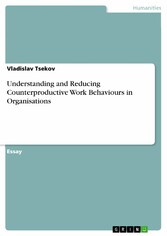Search and Find
Service
Understanding and Reducing Counterproductive Work Behaviours in Organisations
Essay from the year 2018 in the subject Psychology - Work, Business, Organisational and Economic Psychology, grade: A, University College London, language: English, abstract: On a fundamental level, every company and organisation in the world can be regarded as a constellation of human beings, working together towards a mutually accepted overarching goal. An organisation is truly only as great as the people who embody its mission, those who go above and beyond to see the company succeed and to make customers happy. Henceforth, the most important asset in an organisation is not its facilities or market cap, but the individuals that work in it. We could, therefore, expect companies to pay extreme attention and look after their workers so that they can ensure an encouraging and productive work environment. In reality, however, this is rarely the case. In this day of age, revenue and profit have become the leading corporate targets and key performance indicators, leading to a severe neglect of basic psychological needs of employees. The consequences of this mindset are starting to become increasingly evident. More and more companies in the UK and worldwide experience an increase in dysfunctional and harmful actions from employees towards the organisation (Furnham and Taylor, 2011) - such actions are known as counterproductive work behaviours (CWBs). There are multiple forms of counterproductive work behaviours ranging from theft and property destruction to absenteeism and alcohol abuse, etc. and their causes lie either in the individual or in the company. Theft is considered to be one of the most common types of CWBs, with up to 75% of all employees reporting to have stolen from their employer at least once. The purpose of this essay will be to briefly introduce the different types of counterproductive work behaviours and to explain their underlying causes. We will be focusing particularly on theft as it has been shown to be the reason for bankruptcy in one-third of the companies. Having the fundamental theoretical knowledge, we will then focus our attention on curating a researched-based intervention for reducing theft at work, giving action-based advice both on an individual and an organisational level.
All prices incl. VAT












